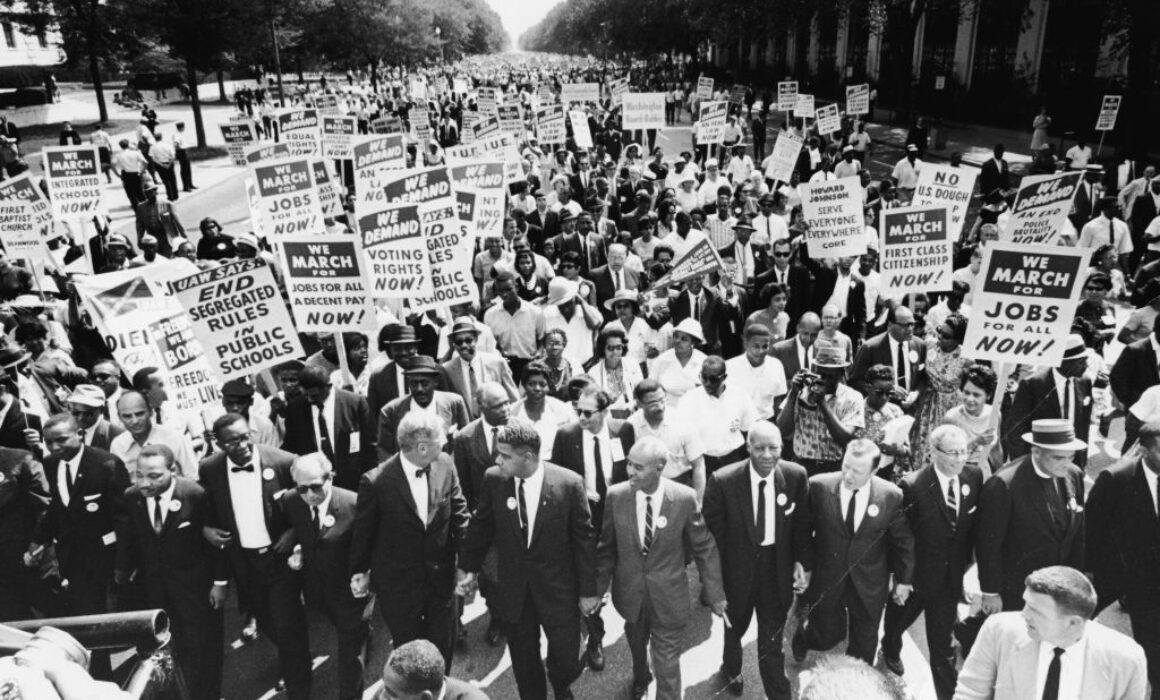Civil Rights + Full Employment = Freedom
April 30, 2024
A new Roosevelt paper takes the concept of full employment back to its civil rights roots.
The Roosevelt Rundown features our top stories of the week.
(Photo by Express Newspapers / Getty Images)
The Civil Rights Movement’s Full Employment Legacy
When activists marched on Washington in 1963, full employment was one of their demands. These days, economists and policymakers see full employment as the rate of unemployment that will prevent inflation. The civil rights movement had a more expansive view: Full employment meant zero involuntary employment. In a new brief, historian and Roosevelt Fellow David Stein and Program Manager Ira Regmi trace the history of the concept and explain how the modern-day definition sidelines the economic well-being of Black Americans.
Spotlighting the role of activists such as Bayard Rustin and Coretta Scott King, the brief outlines legislative and movement struggles from the 1940s to the 1970s—culminating with the 1978 Humphrey-Hawkins Act that committed the Federal Reserve to a full employment mandate. Stein and Regmi then show how full employment was misdefined and deprioritized in favor of inflation management, starting with the Volcker shock and continuing to this day.
The erosion of the idea of true full employment is “a willingness to accept higher rates of unemployment for marginalized communities as the norm,” write Stein and Regmi. In March, for example, despite low overall levels of unemployment, Black workers faced an unemployment rate of 6.4 percent compared to 3.4 percent for white workers. This trend, in which Black unemployment in the US is typically twice as much as white unemployment, is “not an anomaly and instead has become a consistent feature of the American labor market.”
“Buoyed by the power of a large fiscal policy response to the pandemic—the American Rescue Plan and the Inflation Reduction Act—the economy is as strong as it has been in a generation,” the authors write. They add, however, that “there is still a significant way to go in achieving the economic vision of true full employment that the civil rights movement fought for, to say nothing of the movement’s more comprehensive economic agenda.”
Read more in “The Civil Rights Struggle for True Full Employment.”
Discussing a New Economics with Joseph Stiglitz and Natalie Foster
In the wake of neoliberalism, what does the government owe to its citizens? On Wednesday, Roosevelt Chief Economist Joseph Stiglitz and Economic Security Project cofounder Natalie Foster joined Roosevelt President and CEO Felicia Wong for a virtual discussion to answer this question and celebrate the release of their new books.
Stiglitz, author of The Road to Freedom: Economics and the Good Society, discussed how the Right has co-opted and distorted the meaning of freedom, and how progressives can reclaim and reconceptualize it to include all people. Foster, author of The Guarantee: Inside the Fight for America’s Next Economy, explored how measures taken during the pandemic—from the expanded child tax credit to Medicaid expansion—previewed a different approach to governance: one that guarantees basic needs like income, housing, and health care for all people.
“Unlike the scarcity-obsessed thinking of the last 45 years, the guarantee economy guarantees economic rights—guarantees a floor, regardless of race, zip code, or religion,” said Foster. “That allows people to truly live the lives of dignity, of freedom, and of presence that we deserve in this nation.”
What We’re Talking About
🔉 BREAKING: In a 3-2 vote, the @FTC banned noncompete agreements!
This historic move will help strengthen workers' bargaining power & curb corporate concentration while improving job mobility & promoting innovation—a win for workers & our entire economy. https://t.co/wIwBMkRiEK
— Roosevelt Institute (@rooseveltinst) April 23, 2024
What We’re Reading
Where Is Economic Justice Policy Now—and Where Does It Need to Go? – by Roosevelt’s Suzanne Kahn – Nonprofit Quarterly
On the Heels of Historic Volkswagen Union Vote, Starbucks Asks Supreme Court to Curb Labor’s Power – feat. Kahn – USA Today
The Problem Isn’t Financial Literacy, It’s Financial Fairness – coauthored by Roosevelt Senior Fellow Darrick Hamilton – The American Prospect
Freedom for the Wolves – by Roosevelt Chief Economist Joseph Stiglitz – The Atlantic


